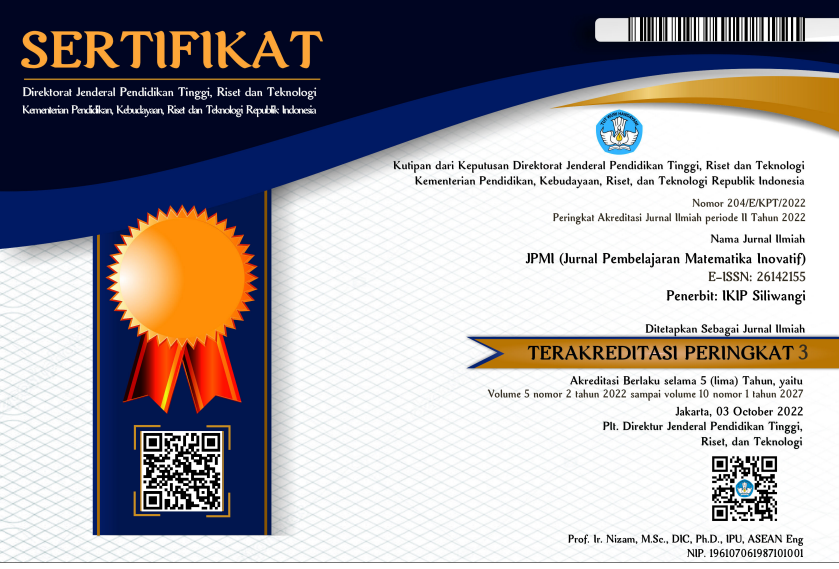Pengaruh self-efficacy dan self-regulated learning terhadap nilai IPK mahasiswa pendidikan matematika
DOI:
https://doi.org/10.22460/jpmi.v8i4.27567Keywords:
Self-Efficacy, Self-Regulated Learning, Academic OutcomeAbstract
Students in mathematics education programs often face challenges that require strong self-belief and the ability to manage their own learning in order to achieve optimal academic performance. This study investigates the influence of self-efficacy and self-regulated learning on students’ Grade Point Average (IPK), focusing on three objectives: (1) the direct effect of self-efficacy on IPK, (2) the direct effect of self-regulated learning on IPK, and (3) the indirect effect of self-efficacy on IPK mediated by self-regulated learning. A quantitative approach with path analysis was employed, involving 40 Mathematics Education students selected through simple random sampling. Data were collected via validated and reliable questionnaires, and analyzed using SPSS and SMART-PLS v.4. The results indicate that the direct influence of self-efficacy on IPK is weak and statistically insignificant. In contrast, self-regulated learning shows a significant and meaningful direct effect on IPK. Furthermore, self-efficacy strongly influences self-regulated learning, which in turn positively affects IPK, confirming an indirect relationship. It is concluded that fostering both self-belief and regulatory learning strategies is essential to improving academic outcomes in higher education.
References
Al-Dawood, I. (2022). Correlation of self-regulated learning on blackboard and academic achievement of islamic studies students. International Journal of Learning, Teaching and Educational Research, 21(9), 370–388. https://doi.org/10.26803/ijlter.21.9.21
Beckers, J., Dolmans, D., & van Merriënboer, J. (2022). Student, direct thyself! Facilitating self-directed learning skills and motivation with an electronic development portfolio. Journal of Research on Technology in Education, 54(4), 617–634. https://doi.org/10.1080/15391523.2021.1906363
Cleary, T. J., Slemp, J., & Pawlo, E. R. (2021). Linking student self‐regulated learning profiles to achievement and engagement in mathematics. Psychology in the Schools, 58(3), 443–457. https://doi.org/10.1002/pits.22456
Freire, C., Ferradás, M. del M., Regueiro, B., Rodríguez, S., Valle, A., & Núñez, J. C. (2020). Coping strategies and self-efficacy in university students: A Person-Centered Approach. Frontiers in Psychology, 11. https://doi.org/10.3389/fpsyg.2020.00841
Galindo-Domínguez, H., & Bezanilla, M.-J. (2021). Promoting time management and self-efficacy through digital competence in university students: A Mediational Model. Contemporary Educational Technology, 13(2), ep294. https://doi.org/10.30935/cedtech/9607
Hanafi, Y., Murtadho, N., Hassan, A. R., Saefi, M., Ikhsan, M. A., & Diyana, T. N. (2021). Self-regulation in qur’an learning. Malaysian Journal of Learning and Instruction, 18. https://doi.org/10.32890/mjli2021.18.2.4
Jaiswal, P. (2019). Using learner-centered instructional approach to foster students’ performances. Theory and Practice in Language Studies, 9(9), 1074. https://doi.org/10.17507/tpls.0909.02
Larsen, A., & James, T. (2022). A sense of belonging in Australian higher education: the significance of self-efficacy and the student-educator relationship. Journal of University Teaching and Learning Practice, 19(4). https://doi.org/10.53761/1.19.4.5
Lee, D., Allen, M., Cheng, L., Watson, S., & Watson, W. (2020). Exploring the relationships between self-efficacy and self-regulated learning strategies of english language learners in a college setting. Journal of International Students, 11(3). https://doi.org/10.32674/jis.v11i3.2145
Li, H., Majumdar, R., Chen, M.-R. A., Yang, Y., & Ogata, H. (2023). Analysis of self-directed learning ability, reading outcomes, and personalized planning behavior for self-directed extensive reading. Interactive Learning Environments, 31(6), 3613–3632. https://doi.org/10.1080/10494820.2021.1937660
Martin, H., Craigwell, R., & Ramjarrie, K. (2022). Grit, motivational belief, self-regulated learning (SRL), and academic achievement of civil engineering students. European Journal of Engineering Education, 47(4), 535–557. https://doi.org/10.1080/03043797.2021.2021861
Miller, C. J., & Bernacki, M. L. (2019). Training preparatory mathematics students to be high ability self-regulators: Comparative and case-study analyses of impact on learning behavior and achievement. High Ability Studies, 30(1–2), 167–197. https://doi.org/10.1080/13598139.2019.1568829
Morris, T. H. (2019). Self-directed learning: A fundamental competence in a rapidly changing world. International Review of Education, 65(4), 633–653. https://doi.org/10.1007/s11159-019-09793-2
Nikolaidis, P., Ismail, M., Shuib, L., Khan, S., & Dhiman, G. (2022). Predicting student attrition in higher education through the determinants of learning progress: A Structural Equation Modelling Approach. Sustainability, 14(20), 13584. https://doi.org/10.3390/su142013584
Novel, F., Ajisuksmo, C. R. P., & Supriyantini, S. (2019). The influence of processing and regulation of learning on academic achievement amongst first year undergraduate psychology students in university of north sumatra. Asian Journal of University Education, 15(2), 36. https://doi.org/10.24191/ajue.v15i2.7555
PALOS, R., MAGUREAN, S., & PETROVICI, M. C. (2019). Self-regulated learning and academic performance – the mediating role of students’ achievement Goals. Revista de Cercetare Si Interventie Sociala, 67, 234–249. https://doi.org/10.33788/rcis.67.15
Purohit, A. (2021). The challenges before higher education for the composite growth of a sustainable society. Problemy Ekorozwoju, 16(2), 192–198. https://doi.org/10.35784/pe.2021.2.20
Sirk, M. (2025). Self-regulated learning skills in vocational students based on their self-evaluation. International Journal for Research in Vocational Education and Training, 12(1), 76–100. https://doi.org/10.13152/IJRVET.12.1.4
van Diemen, T., Craig, A., van Nes, I. J. W., van Laake, C., Bloemen, J., Stolwijk-Swuste, J., Scholten, E., Faber, W., Boerrigter, J., Beurskens, M., Spijkerman, D., Postma, K., Groenewegen, E., Snoek, G., Martens, I., van Nes, I., van Diemen, T., Roels, E., Sprik, J., … Post, M. W. M. (2020). Enhancing our conceptual understanding of state and trait self-efficacy by correlational analysis of four self-efficacy scales in people with spinal cord injury. BMC Psychology, 8(1), 108. https://doi.org/10.1186/s40359-020-00474-6
Vosniadou, S. (2020). Bridging Secondary and Higher Education. The Importance of Self-regulated Learning. European Review, 28(S1), S94–S103. https://doi.org/10.1017/S1062798720000939
Wu, T.-T., Silitonga, L. M., Dharmawan, B., & Murti, A. T. (2024). Empowering students to thrive: the role of ct and self-efficacy in building academic resilience. Journal of Educational Computing Research, 62(3), 596–625. https://doi.org/10.1177/07356331231225468
Zheng, B., Chang, C., Lin, C.-H., & Zhang, Y. (2021). Self-Efficacy, academic motivation, and self-regulation: how do they predict academic achievement for medical students? Medical Science Educator, 31(1), 125–130. https://doi.org/10.1007/s40670-020-01143-4
Zheng, B., Ward, A., & Stanulis, R. (2020). Self-regulated learning in a competency-based and flipped learning environment: learning strategies across achievement levels and years. Medical Education Online, 25(1). https://doi.org/10.1080/10872981.2019.1686949
Downloads
Published
Issue
Section
License

This work is licensed under a Creative Commons Attribution-ShareAlike 4.0 International License.
The author is responsible for acquiring the permission(s) to reproduce any copyrighted figures, tables, data, or text that are being used in the submitted paper. Authors should note that text quotations of more than 250 words from a published or copyrighted work will require grant of permission from the original publisher to reprint. The written permission letter(s) must be submitted together with the manuscript.
















